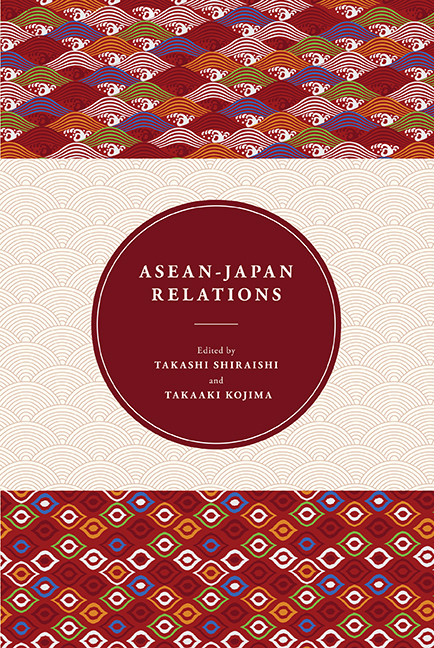Book contents
- Frontmatter
- Contents
- Preface
- About the Contributors
- 1 An Overview of Japan-ASEAN Relations
- 2 Japan's Relations with ASEAN
- 3 Approaches toward Regionalism: Japan, China and the Implications on ASEAN
- 4 The New Japan-ASEAN Partnership: Challenges in the Transformation of the Regional Context in East Asia
- 5 ASEAN-Japan Strategic Partnership and Regional Integration: Impacts and Implications
- 6 ASEAN-Japan Cooperation on Maritime Non-Traditional Security Issues: Toward a New Paradigm
- 7 Japan's Evolving Security Concerns in Maritime Southeast Asia: From Safety of Navigation to “Lake Beijing”
- 8 Evolution of Institutions and Policies for Economic Integration in East Asia: The Rise of China and Changes in the Regional Order
- 9 Managing Integration in East Asia: Behind Border Issues in Japan-ASEAN Trade Agreements
- 10 Regional Financial Cooperation in East Asia: Development and Challenges
- 11 Japanese Development Assistance to ASEAN Countries
- 12 Japanese Foreign Direct Investment in the ASEAN-4 Countries
- 13 Japan's Triple Tsunami
- 14 ASEAN-Japan Relations: A Singapore Perspective
6 - ASEAN-Japan Cooperation on Maritime Non-Traditional Security Issues: Toward a New Paradigm
Published online by Cambridge University Press: 21 October 2015
- Frontmatter
- Contents
- Preface
- About the Contributors
- 1 An Overview of Japan-ASEAN Relations
- 2 Japan's Relations with ASEAN
- 3 Approaches toward Regionalism: Japan, China and the Implications on ASEAN
- 4 The New Japan-ASEAN Partnership: Challenges in the Transformation of the Regional Context in East Asia
- 5 ASEAN-Japan Strategic Partnership and Regional Integration: Impacts and Implications
- 6 ASEAN-Japan Cooperation on Maritime Non-Traditional Security Issues: Toward a New Paradigm
- 7 Japan's Evolving Security Concerns in Maritime Southeast Asia: From Safety of Navigation to “Lake Beijing”
- 8 Evolution of Institutions and Policies for Economic Integration in East Asia: The Rise of China and Changes in the Regional Order
- 9 Managing Integration in East Asia: Behind Border Issues in Japan-ASEAN Trade Agreements
- 10 Regional Financial Cooperation in East Asia: Development and Challenges
- 11 Japanese Development Assistance to ASEAN Countries
- 12 Japanese Foreign Direct Investment in the ASEAN-4 Countries
- 13 Japan's Triple Tsunami
- 14 ASEAN-Japan Relations: A Singapore Perspective
Summary
This chapter deals with non-traditional security issues, focusing particularly on crimes at sea in Southeast Asia, and discusses how ASEAN-Japan cooperation can be effective in combating these challenges. The region, which consists of ten countries, is a hotbed of cross-border crimes, ranging from illegal unreported fishing, unlawful dumping, drug smuggling, human trafficking, timber smuggling, illegal arms trading, to armed robbery at sea. These criminal activities greatly benefit from the weak capacity of the government to control territorial boundary, especially at sea. What are the features of these maritime crimes in Southeast Asia, and in what ways do they pose a threat to the security environment in the region? How have ASEAN and Southeast Asian governments identified the problem and responded to it? How is it strategically important to involve Japan — a country that has campaigned globally for human security agendas — in the framework of regional security cooperation? We examine these questions and highlight the importance of promoting a new paradigm of maritime non-traditional security cooperation that should envisage the dynamics of security-development nexus and properly target the elimination of root causes.
We first examine the development of maritime crimes in the region. We then discuss the major limitations of the existing maritime security cooperation in Southeast Asia, which is heavily “military-oriented” due to the weak capacity of civilian law enforcement agencies at sea. Finally, we argue that a way to overcome these limitations is to shift the policy paradigm and involve Japan so as to accelerate the new paradigm.
EVOLVING MARITIME CRIMES AND HUMAN INSECURITY
The waters of Southeast Asia are subject to all sorts of cross-border crimes, and many civil society organizations question the political will of regional governments in engaging the war on crime at sea. Below, we examine four types of transnational crime that are active in both continental and maritime Southeast Asia. The scale of the crime is, however, overwhelmingly large in the latter.
Piracy and Armed Robberies
Since 80 per cent of Japan's oil imports travel through the Straits of Malacca and 60 per cent of Australia's oil tankers use Indonesian waters, the problem of piracy is a vital concern for ASEAN dialogue partners.
- Type
- Chapter
- Information
- ASEAN-Japan Relations , pp. 96 - 113Publisher: ISEAS–Yusof Ishak InstitutePrint publication year: 2013



